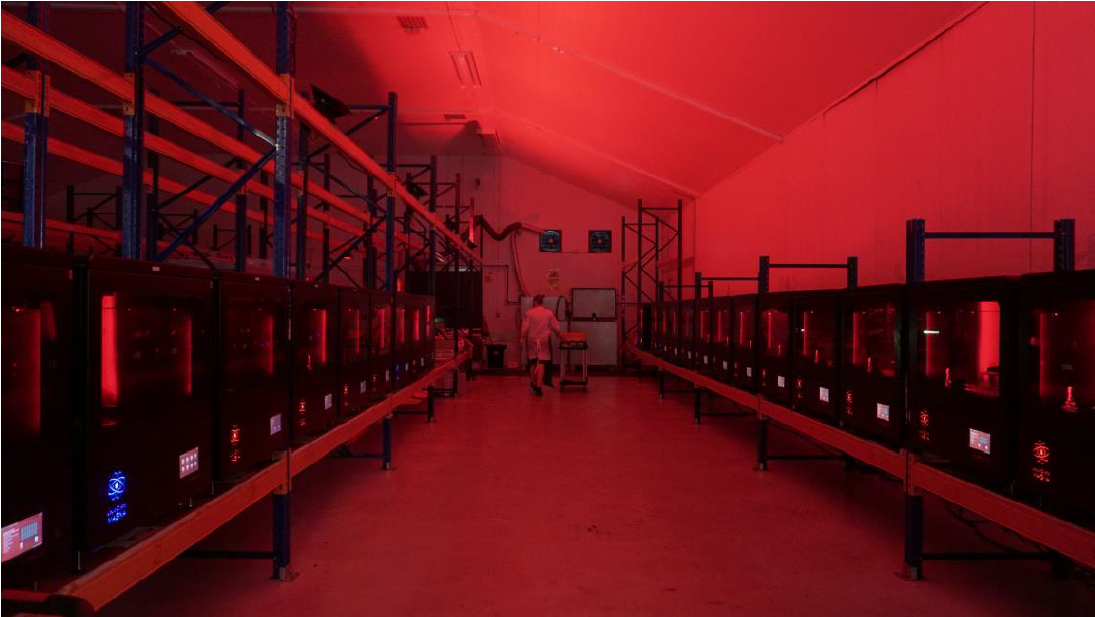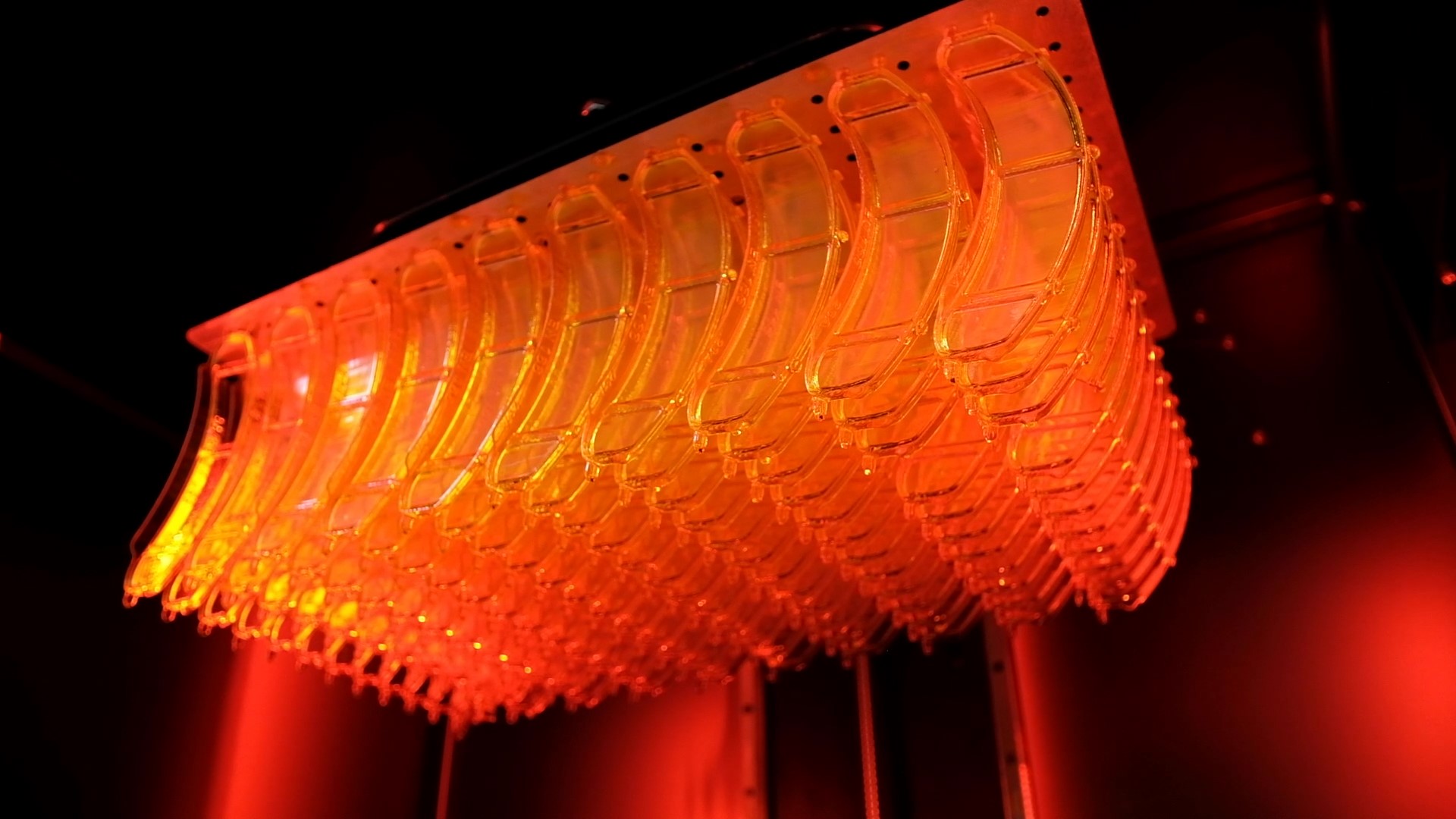3D printer and materials manufacturer Photocentric, has been awarded a contract by the UK government to manufacture over 7.6 million 3D printed protective face shields during the next six months.
The deal will see the Peterborough-based company use its patented 3D printing technology to produce millions of items of PPE every month, with the aim of supporting frontline NHS health workers during the COVID-19 pandemic.
“I am proud of the ingenuity and hard work demonstrated by the whole team at Photocentric. We have shown that it is possible to use our patented 3D printing technology to very rapidly design and make millions of units of an entirely new product,” said Paul Holt, Managing Director and Founder of Photocentric.

Photocentric’s DPP 3D printing technology
Founded in 2002, Photocentric manufactures photopolymer resin, and uses its patented daylight curing process to create products for applications ranging from the industrial sector, to the dental and figurine industries. In dentistry, and in particular aligner manufacture, the company’s LC Magna printer enables orthodontists to batch-produce patient-specific arches at a competitive cost, speed and scale.
Photocentric launched its Liquid Crystal low-cost 3D printer in October 2015, marking its move from photopolymer resin production to full 3D system manufacturing. Based on the company’s Daylight Printing Process (DPP) LCD technology, the desktop system had a layer resolution of 25 microns, and a print volume measuring 200 x 100 x 200 mm. This was followed by the launch of the LC Maximus in November 2018, which was geared towards mass-production and large-scale prototyping. The 3D printer also used DPP technology, but featured a 4K 40” LCD screen, and 700 x 893 x 510mm build size, to enable more parts to be produced at once.
Photocentric’s NHS contract
The first delivery of shields to the national PPE distribution centre on Saturday 30th May, and they are already being used to protect frontline workers against the virus. In order to produce the equipment on a mass scale, Photocentric’s Peterborough headquarters has been transformed into a streamlined production process, where a print farm of over 30 new large-format printers are operating 24/7. Utilizing the large build-volume and rapid print speeds of Magna 3D printers, has enabled the company to produce 135 shield parts per printer, every hour.
The systems, which have been used in the industry for some time to create plastic parts, are currently producing 15,000 components per day, with plans to scale up to making 500,000 per day if required. The 3D printing company intends to bolster its current army of printers to over 100 in the coming months, and hire more than 60 new staff, putting its business on a “war footing.”
Photocentric is now one of 30 companies to have struck a deal with the UK government, with the contracts set to supply over 1.65 billion pieces of PPE to frontline NHS services. The Health Secretary was keen to praise manufacturers taking part, and emphasised the need for their continued support.
“The response from our manufacturing industry has been phenomenal, and I can’t thank them enough for their continued efforts. Every health and care worker must have access to appropriate PPE, and through this national effort we will ensure they do,” said Lord Paul Deighton, adviser to the Health Secretary. “We will continue to identify further opportunities to get more PPE to the frontline rapidly.”

Does the contract have a broader impact on AM?
Photocentric made the dramatic switch to manufacturing face masks in March 2020, after receiving a large and urgent demand for PPE from hospitals in the UK, and further abroad. Using its 3D printing expertise, the company was able to rapidly create plastic objects at scale, and respond immediately. With its first face shield designed and prototyped in just one day, Photocentric now uses its fleet of large-format printers to manufacture thousands of shield parts on a daily basis. What’s more, the Magna 3D printers being used to produce the parts, are driven by low-cost LCD screens which emit daylight to harden vast areas of plastic simultaneously. The DPP technology drastically reduces the cost of additive manufacturing the face masks, and allows the company to produce more components, as a result.
Being able to change its manufacturing process to produce face shields in such vast quantities, and in such a short space of time, has enabled Photocentric to demonstrate the advantages of its 3D printing technology. In addition to exhibiting the speed and adaptability of AM, the mass production contract shows that plastic parts can be produced at prices that are competitive with traditional manufacturing processes. Moreover, it illustrates how 3D printing is no longer reserved for slow, expensive prototyping applications, but can produce hundreds of thousands of parts per day.
An added benefit of the project, according to Holt, is that it proves that PPE no longer needs to be shipped in from abroad, and UK-based manufacturers can provide parts more quickly, and at a competitive price.
“This home-grown, patented technology demonstrates that the UK can reduce dependence on overseas production and manufacture parts locally, making the quantity needed, when they are needed, at a competitive price,” said Holt.
3D printing’s contribution in the fight against COVID-19
Additive manufacturing organizations from around the world have contributed in the fight against COVID-19, and in a variety of ways.
Hungarian 3D printer manufacturer Craftbot launched a Rapid Local Manufacturing Centre (RLM) in Cornwall, UK, to produce PPE for key workers during the pandemic in June 2020. In addition to 3D printing parts, the centre will also serve as an information hub for hobbyists looking for guidance in using their own 3D printers to produce PPE for the national effort.
In April 2020, supercar manufacturer Lamborghini directed its own in-house 3D printing facilities to manufacture medical equipment to fight the Italian COVID-19 outbreak. The company’s R&D department helped to design and manufacture lung simulators in support of the SIARE Engineering International Group, a leading medical respirator manufacturer.
Reports of an Italian hospital needing more respiratory valves in order to maintain its breathing machines, saw Brescia-based engineering firm Ishinova come to its aid. Working with machining firm Lonati, the company 3D printed 100 respirator valves in 24 hours.
You can now nominate for the 2020 3D Printing Industry Awards. Cast your vote to help decide this year’s winners.
To stay up to date with the latest 3D printing news, don’t forget to subscribe to the 3D Printing Industry newsletter or follow us on Twitter or liking our page on Facebook.
Looking for a job in the additive manufacturing industry? Visit 3D Printing Jobs for a selection of roles in the industry.
Featured image shows rows of Photocentric’s Magna 3D printers, which will be used to produce PPE for the NHS. Image via Photocentric.



